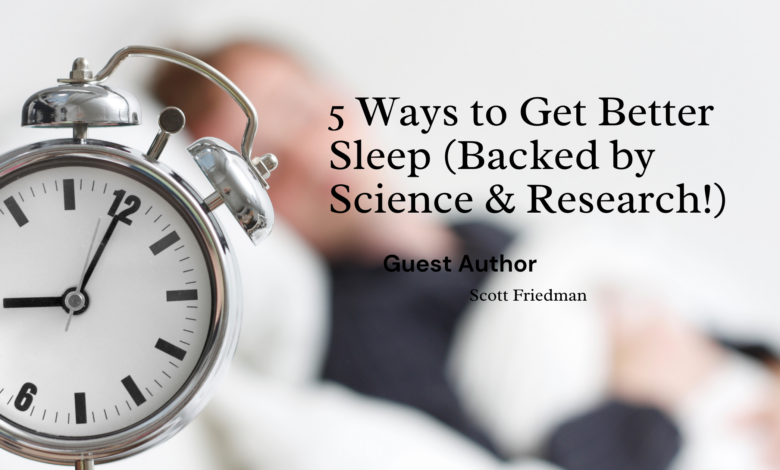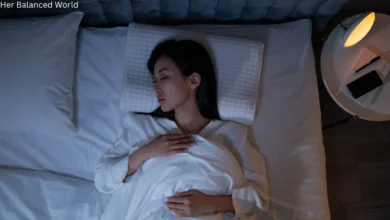5 Ways to Get Better Sleep (Backed by Science & Research!)

Before we dive into sleep improvement strategies, we’d like to introduce Scott Friedman, an experienced fitness professional and wellness coach. With over a decade in the fitness industry, Scott has helped individuals of all ages—from high school athletes to senior citizens—optimize their health, fitness, and well-being. He is also a motivational speaker and the founder of Scott Speaks Fitness, where he shares practical insights on improving physical and mental performance.
Today, Scott shares expert-backed strategies to help you get better sleep and wake up feeling more refreshed.
“Are you getting enough sleep? Generally, we should shoot for 7-9 hours on average of sleep per night.” — Scott Friedman
 Many people believe they are getting enough sleep, but they forget to account for sleep latency—the time it takes to fall asleep. If it takes 20 minutes to drift off and you wake up multiple times during the night, your actual sleep time is much less than you think.
Many people believe they are getting enough sleep, but they forget to account for sleep latency—the time it takes to fall asleep. If it takes 20 minutes to drift off and you wake up multiple times during the night, your actual sleep time is much less than you think.
The good news? Better sleep is achievable with small, research-backed changes, including learning how to get better REM sleep and optimizing sleep hygiene. Below, we’ll cover five expert-backed ways to improve sleep, including sleep hygiene for teens and kids, how to get better REM sleep, and whether natural sleep aids for kids actually work.
📌 Bonus: Need a sleep hygiene guide? Download this Sleep Hygiene PDF from cci.health for expert-backed strategies!
1. Keep Your Room at the Right Temperature
“It’s possible the room is too warm or too cold! Generally, temperatures between 65-68 degrees is the ideal temperature for sleep.” — Scott Friedman
 Science backs this up—research shows that cooler temperatures help regulate melatonin production and promote REM sleep (Harvard Health).
Science backs this up—research shows that cooler temperatures help regulate melatonin production and promote REM sleep (Harvard Health).
- ✅ Keep your thermostat at 65-68°F
- ✅ Use a cooling pillow → Check it out on Amazon
- ✅ Opt for breathable bedding like cotton or bamboo
2. Limit Blue Light Exposure Before Bed
“Watching T.V or scrolling your phone may be hurting your sleep due to blue light that emits from each of those devices.” — Scott Friedman
 According to the National Sleep Foundation, exposure to blue light before bed suppresses melatonin, making it harder to fall asleep and affecting how to get better REM sleep naturally. (National Sleep Foundation).
According to the National Sleep Foundation, exposure to blue light before bed suppresses melatonin, making it harder to fall asleep and affecting how to get better REM sleep naturally. (National Sleep Foundation).
- 📱 Turn on Night Mode or Dark Mode on your phone
- 👓 Use blue light blocking glasses → Check them out on Amazon
- 📖 Read a book instead of scrolling on your phone
3. Avoid Caffeine Too Close to Bedtime
“The half-life of caffeine is 4-6 hours, which means if you drink coffee at 3 PM, and you drink 100mg of caffeine, that means by 7-9 PM you still have 50mg of caffeine in your system.” — Scott Friedman

Research from Johns Hopkins Medicine confirms that caffeine reduces deep sleep quality and increases nighttime wake-ups (Johns Hopkins Study).
4. Avoid Eating Right Before Bed
“Eating before bed can disrupt your circadian rhythm, which is your body’s natural rhythm.” — Scott Friedman
 Studies from Harvard Medical School indicate that eating before bed raises insulin and delays melatonin production, disrupting sleep cycles (Harvard Research).
Studies from Harvard Medical School indicate that eating before bed raises insulin and delays melatonin production, disrupting sleep cycles (Harvard Research).
Tips to Avoid Late-Night Eating:
- ✅ Eat your last meal 2-3 hours before bed
- 🍏 If hungry, opt for light snacks like almonds or yogurt
- 💧 Stay hydrated to reduce late-night cravings
5. Sleep Hygiene for Kids & Teens (What Works Best?)
Children and teenagers have different sleep needs, and their challenges differ significantly. Below, we explore scientifically proven methods to improve their sleep.
Sleep Hygiene for Kids
Practicing good sleep hygiene for kids is essential since children, depending on their age, require 9 to 13 hours of sleep per night to support their rapid physical and cognitive development (Children’s Health).
- ✔ Consistent Sleep Schedule – A fixed bedtime and wake-up time regulate their circadian rhythm.
-
✔ Bedtime Routine – Reading a story, taking a warm bath, or playing soft music can help. Adding a natural sleep aid for kids, like a soothing herbal tea or lavender diffuser, may further promote relaxation and deeper sleep.
- ✔ Limit Screen Time – Avoid electronic devices one hour before bedtime to prevent melatonin disruption.
- ✔ Comfortable Sleep Environment – A dark, quiet, and cool room enhances sleep quality.
-
💤 Sound Machine & Night Light for Better Sleep
•Why? A combination white noise machine and night light helps children sleep longer and more soundly by creating a soothing sleep environment. The gentle sounds mask background noise, and the soft light provides comfort without disrupting melatonin levels.
•🛒 Check it out on Amazon → Sound Machine for Kids
Sleep Hygiene for Teens
Teenagers typically need 8 to 10 hours of sleep per night, but social life, academic stress, and late-night screen use often interfere with their sleep. That’s why following good sleep hygiene for teens—like maintaining a bedtime routine, avoiding screens before bed, and limiting caffeine—can significantly improve their overall well-being (Sleep Foundation).
- ✔ Regular Sleep Schedule – Even on weekends, a consistent schedule prevents sleep deprivation.
- ✔ Pre-Bedtime Wind-Down – Relaxing activities like reading or meditation help transition into sleep.
- ✔ Limit Caffeine & Energy Drinks – Avoid caffeine at least 8 hours before bed for better REM sleep.
- ✔ Screen Time Management – Using blue light glasses or enabling night mode can help reduce blue light exposure.
- ✔ Optimal Sleep Setting – Using blackout curtains → Check them out on Amazon for a distraction-free sleep environment.
-
🌙 Weighted Blanket for Anxiety & Better Sleep
•Why? Weighted blankets have been scientifically proven to reduce stress and anxiety, helping teens relax and fall asleep faster. They provide deep pressure stimulation, mimicking the feeling of a hug, which promotes melatonin and serotonin production.
•🛒 Check it out on Amazon → Weighted Blanket for Teens
By implementing age-appropriate sleep hygiene habits, both children and teenagers can achieve better sleep, leading to improved focus, health, and mood.
FAQs: Your Sleep Questions Answered
1. What is sleep hygiene?
Sleep hygiene refers to healthy sleep habits that improve sleep quality, such as maintaining a consistent bedtime, limiting screen time, and optimizing your sleep environment.
📖 Need a detailed guide? Check out this Sleep Hygiene PDF.
2. How can I sleep well naturally?
- ✅ Maintain a consistent sleep schedule
- ✅ Create a dark, cool sleep environment
3. How do I get better REM sleep?
- 💡 Maintain a consistent sleep schedule
- 🚫 Avoid caffeine and screen time before bed
4. What is the best natural sleep aid for kids?
-
A natural sleep aid for kids can include options like magnesium supplements, white noise machines, or lavender essential oils, all of which help create a calm bedtime routine.
-
🌿 Magnesium supplements → Check it out on Amazon
- 🌙 White noise machines to help with relaxation
- 💜 Lavender essential oils for a calming bedtime atmosphere
5. How does eating before bed affect sleep?
Eating too close to bedtime can disrupt circadian rhythms by affecting melatonin and insulin levels (Harvard Research).
💡 Tip: Avoid meals 2-3 hours before bed to promote better sleep quality.
Conclusion: Improve Your Sleep Tonight!
By following these 5 sleep hygiene tips, you can drastically improve REM sleep, deep sleep quality, and overall well-being. If you’re wondering how to get better REM sleep, focus on limiting blue light, maintaining a regular sleep schedule, and avoiding late-night caffeine.
📌 Want to stay healthy this winter? 🌿 Learn how to boost your immune system naturally with expert-backed remedies in our latest guide:
➡️ How to Stay Healthy This Winter: Natural Remedies for Wellness






One Comment